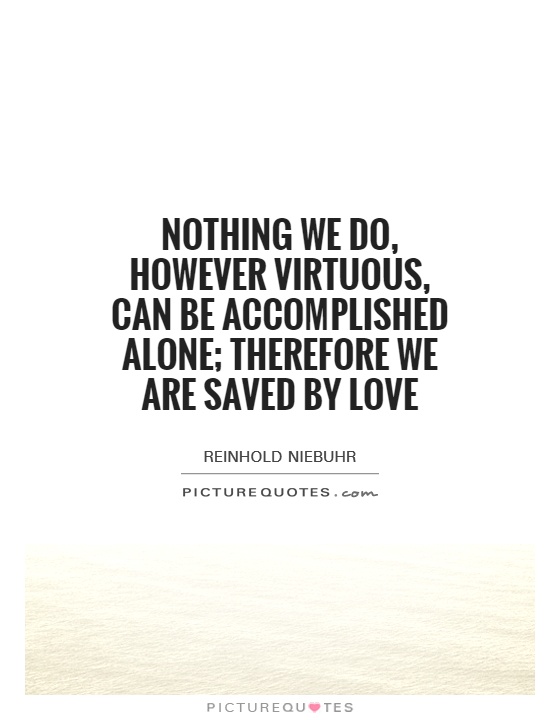Nothing we do, however virtuous, can be accomplished alone; therefore we are saved by love

Nothing we do, however virtuous, can be accomplished alone; therefore we are saved by love
Reinhold Niebuhr, a prominent American theologian, ethicist, and public intellectual, is often associated with the idea that human beings are inherently flawed and incapable of achieving perfection on their own. This belief is reflected in his famous quote, "Nothing we do, however virtuous, can be accomplished alone; therefore we are saved by love."Niebuhr's philosophy is rooted in the Christian tradition, which teaches that humans are sinful and in need of redemption. According to Niebuhr, our efforts to do good in the world are always tainted by our own selfish desires and limitations. We are unable to achieve true virtue or righteousness on our own because of our inherent flaws and weaknesses.
However, Niebuhr also believed in the power of love to transcend our individual shortcomings and bring about positive change in the world. He saw love as a force that could unite people, inspire them to work together for the common good, and ultimately lead to salvation.
In Niebuhr's view, love is not just a sentimental feeling or emotion, but a powerful and transformative force that has the ability to overcome the divisions and conflicts that separate us. It is through love that we are able to connect with others, empathize with their struggles, and work together to create a more just and compassionate society.
Niebuhr's concept of love is not limited to romantic or familial relationships, but extends to all forms of human connection and solidarity. He believed that love could motivate us to care for the marginalized and oppressed, advocate for social justice, and strive for a more equitable and peaceful world.












 Friendship Quotes
Friendship Quotes Love Quotes
Love Quotes Life Quotes
Life Quotes Funny Quotes
Funny Quotes Motivational Quotes
Motivational Quotes Inspirational Quotes
Inspirational Quotes